序章
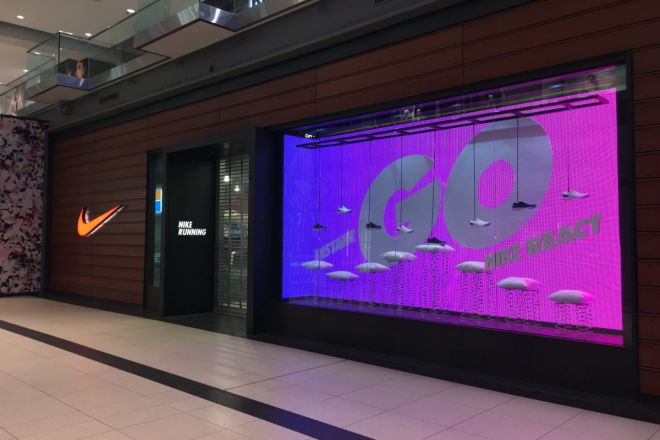
Window LED display design plays a pivotal role in the modern business environment. As the facade of the store, the window is not only an important platform for displaying goods but also the key to conveying the brand concept and attracting the attention of customers.
The LED display screen has become an important medium for window display with its advantages of high brightness, high definition, energy saving, and environmental protection.
The design of the window LED display screen not only requires beauty and generosity but also needs to pay attention to practicality and the effectiveness of information transmission.
A successful window LED display design can attract the attention of passers-by and vividly present brand information, product characteristics, and promotional activities to customers so as to stimulate customers’ desire to buy and improve the sales performance of the store.
So, how do you calculate a successful window LED display design? This article tells you.
1. Why is the LED display very important for current store windows?
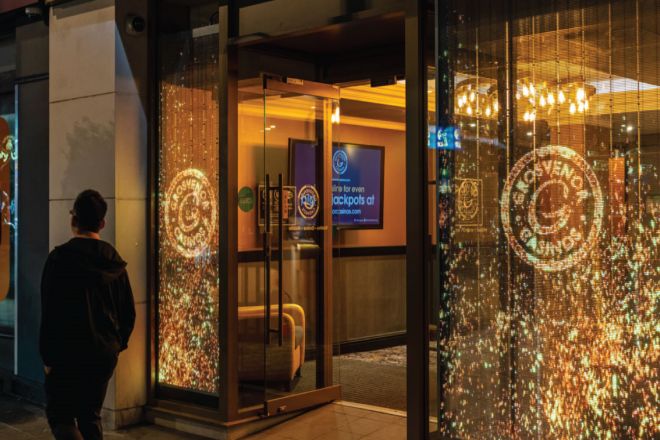
The reason why the LED display is very important for current store windows can be analyzed and explained in depth from many aspects. The following is a detailed explanation of the importance of the application of LED displays in store windows:
- Strong visual attraction
With its high resolution, high contrast, and rich color expression, the LED display can present delicate and realistic images and videos, bringing a strong visual impact to customers. This high-definition display effect makes the product display more vivid and vivid, which can attract customers’ attention and stimulate their desire to buy.
In addition, the LED display also has the advantage of being dynamic. Compared with the traditional static display method, the LED display screen can play animation, video, and other dynamic content, making the window display more interesting and attractive.
Dynamic pictures not only attract the attention of customers but also give them a more intuitive understanding of the characteristics and advantages of goods.
- Flexible and changeable display methods
The flexibility of LED displays allows merchants to customize the display according to different needs and scenarios. Whether it is promoting new products, releasing promotional information, or creating a festive atmosphere, the LED display can easily cope with it. Merchants can diversify and personalize the window display by changing the display content, adjusting the playback order, etc.
In addition, the LED display also supports a variety of interactive functions. Through the integrated touch screen, voice recognition, and other technologies, customers can interact with the window content to have a richer shopping experience.
This interactive display method can not only increase the sense of customer participation but also enhance the brand image and customer loyalty of the store.
- Improve the brand image and grade
The modern design of the LED display and the application of high-end technology make the shop windows show a fashionable and technological atmosphere. This atmosphere can enhance the brand image and grade of the store so that customers can have a better impression and trust in the store.
At the same time, the personalized design of the LED display can also highlight the characteristics and style of the store. Merchants can choose the right color, font, animation, and other elements according to their brand concept and target audience to create a unique window display effect. This personalized display method can enhance the store’s recognition and memory, as well as enhance customers’ awareness and loyalty to the brand.
- Energy conservation, environmental protection, and economic benefits
The LED display has low energy consumption and long service life, which is more energy-saving and environmentally friendly than the traditional display method. This not only helps to reduce the operating costs of stores but also meets the requirements of modern society for environmental protection and sustainable development.
In addition, the efficiency and stability of the LED display can also bring economic benefits to the store. Through accurate display content delivery and data analysis, merchants can better understand the needs and preferences of customers, optimize the product structure and marketing strategy, and improve sales performance.
- Adaptability and scalability
The LED display has good adaptability and scalability and can adapt to window spaces of different sizes and shapes. Whether it is a large shopping mall or a small boutique, you can choose the appropriate LED display screen for window display according to your actual needs.
At the same time, with the continuous progress of technology and the continuous development of the market, the function and performance of LED displays are also improving. Merchants can upgrade and expand the LED display according to market trends and changes in customer needs to maintain the advancement and competitiveness of window displays.
2. What are the common mistakes in the design of window LED displays?
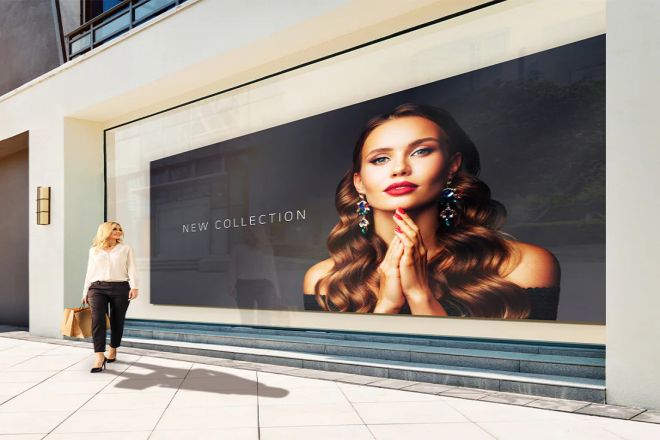
The following are specific examples of some common errors in the design of window LED displays:
- Error 1: The size and resolution do not match
The window space is limited. If the size of the LED display is too large or too small, it may affect the visual effect. If the resolution is too low, the image will be blurred and affect the viewing experience. Therefore, the appropriate size and resolution need to be selected according to the actual space and viewing distance of the window.
For example, the size of your window LED display is too large, almost occupying the entire window area, but the resolution is relatively low. This makes the high-definition videos and pictures played blurry, and customers can’t clearly see the details of the product and the brand logo, which seriously affects the visual effect and the transmission of the brand image.
- Error 2: Improper color matching
Color is an important factor in attracting customers’ attention, but color matching that is too dazzling or does not conform to the brand image may cause discomfort or misunderstanding. Therefore, when designing, you should choose the right color according to the brand tone and ensure that the color matching is harmonious and unified.
- Error 3: The content is too complicated
In order to pursue the comprehensiveness of information, some designers pile up a large number of text, pictures, and video elements on the display screen, making the content too complicated to highlight the key points. The correct way should be to streamline the content and highlight the core information so that customers can see it at a glance.
For example, the window LED display of an electronics store displays pictures, prices, discount information, and other content about multiple products at the same time, with dense text and overlapping pictures. This makes it difficult for customers to capture key information in a short period of time, and they can’t be impressed by any product.
- Error 4: Improper font selection
The size, style, and color of the font will affect the readability of the information. If the font is too small or the style is too complicated, it may be difficult for customers to recognize. Therefore, when choosing a font, you should consider the viewing distance and light conditions to ensure that the font is clear and easy to read.
- Error 5: Lack of creativity
Window LED display design needs to be creative and unique to attract the attention of customers. If you simply copy the design of other stores or lack innovative elements, it will be difficult to stand out in the highly competitive market.
It’s like you’re opening a coffee shop. The design of the window LED display is similar to that of many other stores. It simply shows pictures of coffee cups and coffee beans without any unique creative elements. Such a design cannot attract the attention of customers, nor can it highlight the characteristics and advantages of the store.
- Error 6: Ignore brand characteristics
The LED window display is an important window for displaying the brand image. If the design ignores the brand characteristics, it cannot effectively convey the brand information. Therefore, the brand tone, concept, and culture should be fully considered when designing to ensure that the design is consistent with the brand image.
For example, the window LED display design of a high-end jewelry brand is too fancy, using a lot of flashing lights and animation effects, which does not match the noble and elegant image of the brand. Such a design not only does not improve the brand image but may cause customers to misunderstand the positioning of the brand.
3. Basic principles of shop window LED display design
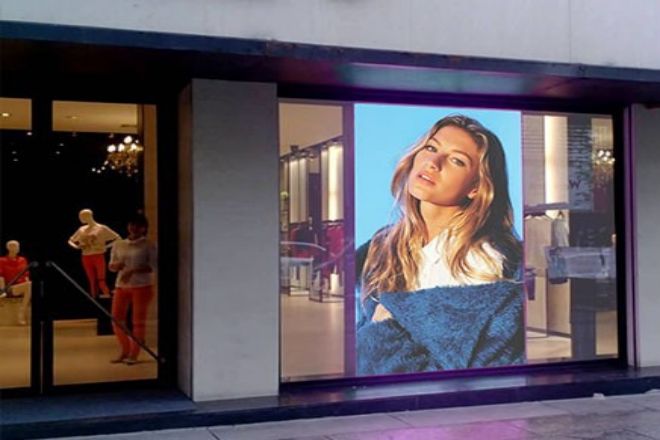
The basic principles of store window LED display design cover many aspects to ensure that the final display effect can meet the expectations of merchants while attracting and meeting the needs of consumers. The following are some key design principles:
1). Goal-oriented principle
Clear display goal: At the beginning of the design, it is necessary to clarify the display goal of the LED display screen, such as promoting new products, improving brand image, attracting customers, etc., to ensure that all design elements revolve around this goal.
For the target audience: have an in-depth understanding of the preferences, needs, and consumption habits of the target customer group so as to design a window display content that is more in line with their tastes.
2). The principle of visual attractiveness
Highlight highlights: Use the high-definition picture quality and dynamic effects of the LED display to highlight the unique selling points and advantages of the display product and attract the attention of customers.
Creativity and uniqueness: Break the traditional display method, integrate innovative elements and personalized design, and make the window LED display stand out among many stores.
3). The principle of unity of content and form
The content is consistent with the brand image: ensure that the display content is in line with the brand positioning and style characteristics of the store, and strengthen the brand image.
The form serves the content: choose the appropriate display form, such as animation, video, graphic combination, etc., to present the display content in the best way and improve the transmission efficiency of information.
4). The principle of ease of use
Concise and clear: avoid too complicated or confusing design, ensure that customers can quickly understand the display content, and reduce cognitive difficulty.
Easy to update and maintain: The design should take into account the subsequent update and maintenance of the content to ensure that merchants can easily manage and adjust the LED display.
5). The principle of sustainability
Energy saving and environmental protection: Choose a high-efficiency and energy-saving LED display to reduce energy consumption and meet environmental protection requirements.
Long-term benefits: The service life and cost-effectiveness of the LED display are considered in the design to ensure a balance between long-term investment and benefits.
4. Shop window LED display design elements
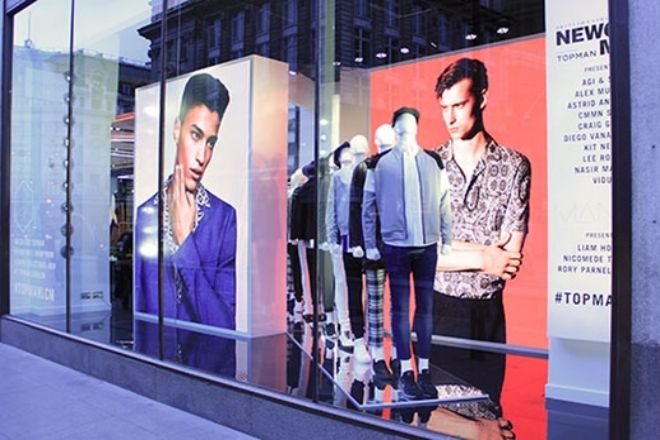
In detail, the design elements of the store window LED display involve a number of key aspects, which together determine the final effect and use experience of the display. The following is an in-depth analysis of these design elements:
- The selection and configuration of hardware is the basis of design:
The characteristics of screen size, resolution, brightness, contrast, and permeability need to be determined according to the actual situation and the window’s display requirements.
For example, for designs that need to maintain window transparency, high permeability LED display material should be selected to ensure the best transparency of the glass.
At the same time, considering that the window may be under different lighting conditions, the brightness and contrast of the display screen also need to be adjusted accordingly to ensure good visibility in different environments.
- Content and form design are the keys to the display effect:
Content planning should be closely integrated with brand image, product characteristics, and market trends to highlight the core selling points and advantages of the product. At the same time, the integration of creative elements can enhance the fun and attractiveness of the display content and attract the attention of customers.
In terms of formal design, we should pay attention to the combination of dynamic and static, as well as the coordination of color matching and style, so as to create an atmosphere and style in line with the brand image.
- The optimization of the viewing experience is also a part that cannot be ignored in the design:
By reasonably arranging the viewing distance and angle and increasing the sense of interaction and participation, customers’ shopping experience can be improved. For example, the integration of touch screens, voice recognition, and other technologies can realize the interaction between customers and the display screen and increase the fun and participation in shopping.
- The convenience of installation and maintenance is also a factor to be considered in the design:
Choose the appropriate installation method to ensure that the display is stable and easy to maintain. At the same time, convenient update interfaces and tools are provided to facilitate merchants’ ability to update the display content at any time and maintain the freshness and timeliness of the window.
結論
The window LED display injects new vitality into the commercial display field with its unique design concept and excellent performance. However, the concept of each store is different, and the applicable LED display screen is also different. So, if you have any questions about the LED display, ご連絡ください。
